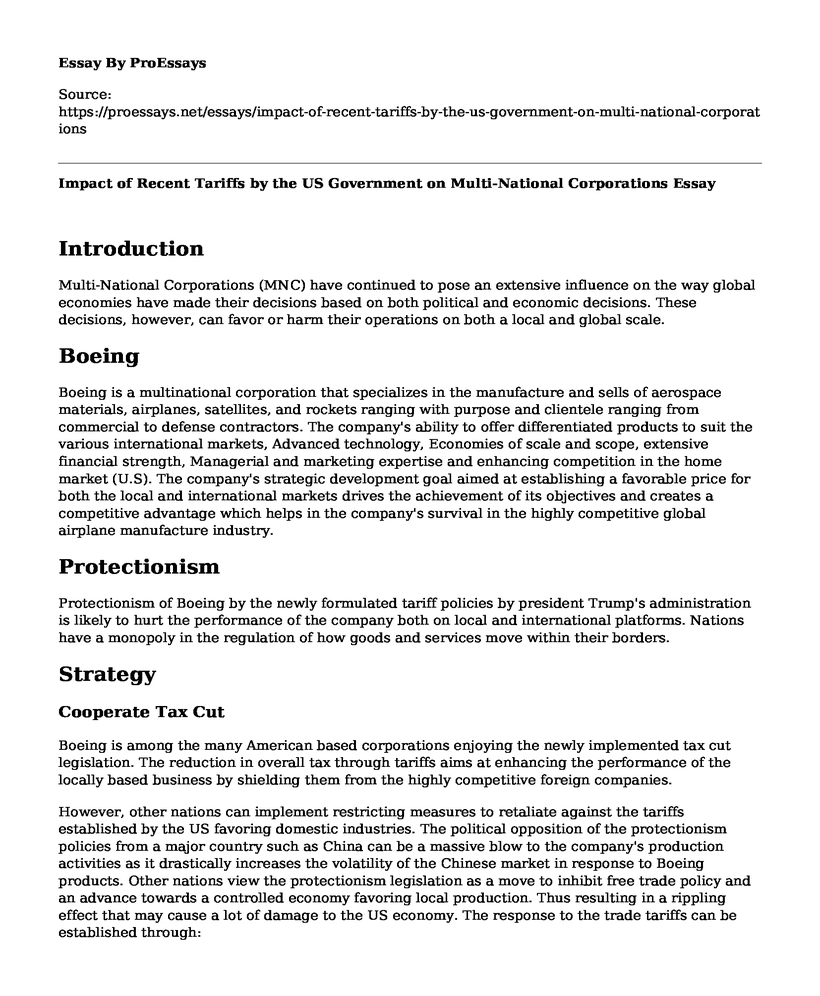Introduction
Multi-National Corporations (MNC) have continued to pose an extensive influence on the way global economies have made their decisions based on both political and economic decisions. These decisions, however, can favor or harm their operations on both a local and global scale.
Boeing
Boeing is a multinational corporation that specializes in the manufacture and sells of aerospace materials, airplanes, satellites, and rockets ranging with purpose and clientele ranging from commercial to defense contractors. The company's ability to offer differentiated products to suit the various international markets, Advanced technology, Economies of scale and scope, extensive financial strength, Managerial and marketing expertise and enhancing competition in the home market (U.S). The company's strategic development goal aimed at establishing a favorable price for both the local and international markets drives the achievement of its objectives and creates a competitive advantage which helps in the company's survival in the highly competitive global airplane manufacture industry.
Protectionism
Protectionism of Boeing by the newly formulated tariff policies by president Trump's administration is likely to hurt the performance of the company both on local and international platforms. Nations have a monopoly in the regulation of how goods and services move within their borders.
Strategy
Cooperate Tax Cut
Boeing is among the many American based corporations enjoying the newly implemented tax cut legislation. The reduction in overall tax through tariffs aims at enhancing the performance of the locally based business by shielding them from the highly competitive foreign companies.
However, other nations can implement restricting measures to retaliate against the tariffs established by the US favoring domestic industries. The political opposition of the protectionism policies from a major country such as China can be a massive blow to the company's production activities as it drastically increases the volatility of the Chinese market in response to Boeing products. Other nations view the protectionism legislation as a move to inhibit free trade policy and an advance towards a controlled economy favoring local production. Thus resulting in a rippling effect that may cause a lot of damage to the US economy. The response to the trade tariffs can be established through:
Avoidance of Tax Neutrality by China
The taxes imposed on the products by Boeing from other Nations can be based on tax reasons rather than the economic goal.
Canceling Ongoing Orders
Canceling the continuous orders will hurt the growth of Boeing as they are their mainstream market controlling at least a fifth of the company's market.
Creating Market Imperfections
These imperfections may exist in the form of Legal restraints on movement of Boeing products, Increased Shipping costs, transactions costs and tax arbitrage.
Governments opposing the tariffs will likely resolve to a more indirect approach in their quest to respond to the tariffs implemented by the USA.
The Hurt That May Arise From Protectionism of Boeing
Some of the main challenges that my face the company in case of withdrawal by its largest customer entails but not limited to:
Decreased Investments in the Company Stocks
Investors are motivated to put their stakes in accompany with the hope of attaining high returns when compared with the subjective time preference. Withdrawal of China will undoubtedly result in a decrease in returns expected from the company's activities thus leading to a reduction in the potential return in the higher time frame (Kitroeffmarch, 2018). This is shown in figure 1 below:
Fig 1: Production Opportunity Set (POS)
Unemployment
The decrease in output as a result of reduced market share will automatically influence the rate of hiring and firing by the company.
Reduced Revenue
Revenues derived from the activities of Boeing will decrease at a personal level (employees), nationwide (USA), and Globally (other countries where the corporation has invested in).
Increased Debts
A reduction in sales means a corresponding decrease in jobs and income earned to pay the debts accrued during production. The latter result to a violation of the 5 C's governing lending as Boeing will no longer be able to have enough income to cover the interest rates as the lending markets become volatile too.
Conclusion
In as much as the established tariffs provide a favorable environment for locally based companies to compete favorably with foreign companies which have a comparatively higher trade propensity, the tariffs prone these domestic companies to the current trade wars with other developed nations. Boeing, therefore, must consider implementing policies aimed at deterring the effect of the tariff legislation on its global and local activities.
Cite this page
Impact of Recent Tariffs by the US Government on Multi-National Corporations. (2022, Apr 07). Retrieved from https://proessays.net/essays/impact-of-recent-tariffs-by-the-us-government-on-multi-national-corporations
If you are the original author of this essay and no longer wish to have it published on the ProEssays website, please click below to request its removal:
- Macro-Economic Commentary on Inflation Rate in Manila: Paper Example
- Paper Example on Business Legal Issues
- How USA Does Business With Other Countries Essay Example
- Essay Sample on Supply and Demand Condition
- Google: Employees Feel Proud & Admired, Satisfied Needs - Essay Sample
- Essay Example on Corporate Law: Transaction Costs & Collective Action
- Free Paper Example on Uber's Troubled Journey: From 2017 to Date







